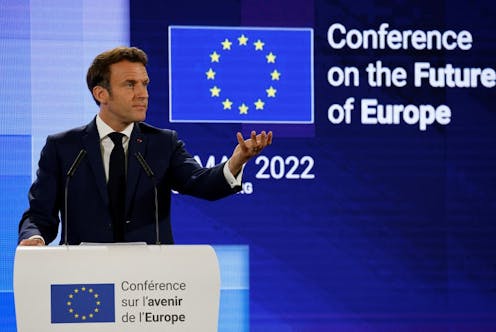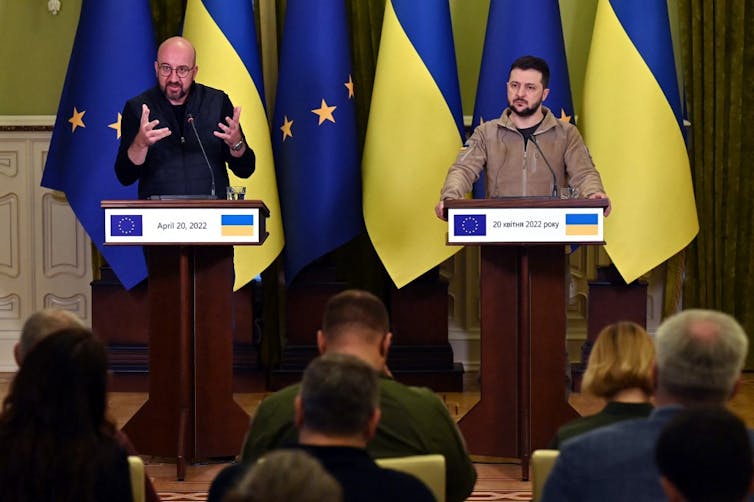
The war that is taking place in Ukraine is redrawing the geopolitical map across the continent and shaking up Europeans’ presuppositions. It is reshaping their relationship to security, to their neighbours and challenges the European Union to redefine the foundations of the European construction.
On top of the humanitarian, financial and military aid that will have to be provided to Ukraine for many years to come, Europeans must first and foremost put forward a political initiative to reconnect to their history and geography and thus respond to the challenges of our time both in the East of the Union and in the Western Balkans.
Proposed on 9 May in Strasbourg, Emmanuel Macron’s “European political community” is a promising approach. Inspired by former president François Mitterrand’s initial idea of a European confederation, the French president (1981-1995) outlined a European forum that would be separate from the European Union:
“This new European organisation would enable democratic European nations adhering to our set of values to find a new area of political cooperation, security, cooperation in energy, transport, investment, infrastructure, and the movement of people, especially our young people. Joining it would not necessarily prejudge future membership of the European Union, just as it would not be closed to those who have left the latter.”
Can this European political community go a different way than the European confederation envisioned and led by the French president between 1989 and 1991? Undoubtedly, provided it goes beyond the original project, adapting it to the new realities of the 2020s, and making it the political bridgehead of the European project.
From the European confederation to the European political community
Periods of profound change in the European order tend to foster the emergence of new ideas. That of a European confederation was born in 1989 within a still divided Europe. As promising as it was, the project soon raised a number of concerns, in particular that it would only offer Eastern European countries the prospect of a two-tier Europe, or a cheap alternative to membership in the European Community.
And in fact, wasn’t the European confederation, for an occasionally reluctant Western Europe, in particular France, the means of relegating Central and Eastern Europe to the side lines of a political bloc concerned with its consolidation? From this standpoint, does Emmanuel Macron’s proposal not amount to effectively ruling out the rapid accession of Ukraine to the EU, and in so doing, does it not create a new antechamber in which the countries of the East (Ukraine, Georgia, Moldova) and those of the Western Balkans (Albania, Bosnia-Herzegovina, Kosovo, Northern Macedonia, Montenegro, Serbia) will be invited to wait for many more years?
This constant criticism of any approach that deviates from the sacred goal of rapid and full membership in the European Union ignores an unfortunate fact. Full membership in the European Union remains an important goal, but unless the Copenhagen accession criteria are revised, it can only be a long-term, uncertain one, which the member states themselves do not hesitate to make more difficult to achieve. The countries of the Western Balkans have been paying the price for the past two decades, with no clear prospects for EU membership. One of them, North Macedonia, even agreed to change its name in order to lift Greece’s veto in the European Council, only to be blocked by Bulgaria.
The Copenhagen dogma and the intergovernmental logic that has prevailed since the Lisbon Treaty make any shortcut to membership entirely unrealistic. The EU’s enlargement policy, in principle based on merit, is today above all a source of immense frustration in the Western Balkans.
There are solutions, however, as Europe is being built more and more through differentiated integration. Some countries have already placed themselves in this position of lesser integration – by not belonging to the euro zone, Schengen area or the Europe de la défense. Although it raises very legitimate issues in terms of coherence, differentiated integration gives some leeway for enlarging European construction while contributing to its deepening. Europe in 2022 must be thought in terms of this differentiated deepening approach.
Faced with an immediate accession that is illusory, how can we recognise today that the citizens of Ukraine and the other countries of Eastern Europe belong to a European family that shares a common political project? And how to do so while preserving the unity of our continent and the strength of the Union?
Europe must face its dilemmas
Over the last 20 years, the Union has deepened significantly – in the area of economic and monetary policy, in the environment, defence, health, etc. But this deepening of the European integration has not been uniform. It has focused on market integration and expanding the acquis communautaire.
This emphasis has long neglected the political vocation of the European integration. Rightly forecast by Jürgen Habermas or John Dewey, the reaction since has been a growing disaffection with the European construction process. It has also led to a rise in populism, a contestation over the role of experts, a resurgence of nationalism and, more generally, a democratic crisis.
Economic and regulatory integration has brought much to Europe, but real deepening, today more than 1989, will only happen through initiatives aiming to endow Europe with a political soul and Europeans with an active awareness of their European citizenship.
Such a project would neutralise the objection that further EU enlargement could jeopardise the bloc’s integration. Over the past twenty years, the EU has almost doubled the number of its member states – and lost one of them, with Brexit in 2020. Despite its shortfalls, the EU is currently responding to historic crises. Its previous enlargements have in no way been weaknesses, quite the contrary.
And yet, this point remains a strong obstacle to enlargement, since the accession of new member states raises questions about the creation of a political Europe. However, how can this be achieved, if what prevails in terms of European integration both between the member states and with the countries of Eastern Europe and the Balkans remains the logic of integration through the market and the law? The challenge today, with the European Political Community, is to get out of the rut in which Europe has found itself, or in other words, to get out of the enlargement/deepening integration dilemma.

In order to do this, Europe cannot settle for tinkering around the edges. The war in Ukraine is a pivotal moment that challenges the EU and its ability to reinvent itself. Although the EU might feel tempted to focus on the long term, it must also provide strategic impulses in the short term. This time-related dilemma is fundamental, given the significant erosion of the EU’s credibility in terms of enlargement policy in the Western Balkans.
Re-injecting politics into Europe
By placing these dilemmas at the forefront of the European question, the Mitterrandian idea of a European confederation can serve as a source of inspiration today. In practice, what would it look like?
First and foremost, the European confederation must serve as a cradle for a new generation of European citizens, who should be brought up as such through practical projects. For example, in the schools of the member states of the confederation, the teaching of democratic citizenship, of European history, culture, ethics and languages should be an integral part of the national educational programme.
To form this new generation of Europeans, the confederation will be able to rely on mobility as a political program at an age when the identities of young citizens are still in the making. Exchange programs at the confederal level could allow teenagers to experience European mobility and conceive of their civic engagement at the continental level. Such programmes should be the absolute norm rather than the exception. Solidarity could then be consolidated through a confederal civil or military service.
The creation of such a confederation, with European citizenship at the heart of the project, cannot be carried by elites alone. On the contrary, it is important to conceive it as an exercise in participatory democracy, preparing future generations of Europeans for their role as citizens. In the meantime, the peoples of Europe could be asked to vote regularly on whether or not to keep their country in the confederation, as part of national elections, for example.
All European countries should be invited to join this confederation – the countries of Eastern Europe and the Balkans as well as the EU member states – as long as party pluralism, free elections, a representative system and freedom of information are guaranteed. Becoming a member of the confederation will signal citizens’ commitment to European federalism.
The next few months will be crucial for Europe. The constitution of a confederation of Europeans would square a historical circle: to deepen the European project by providing it with a true political, citizen and democratic soul, while enlarging it to the peoples sharing these ideals.
The authors do not work for, consult, own shares in or receive funding from any company or organization that would benefit from this article, and have disclosed no relevant affiliations beyond their academic appointment.
This article was originally published on The Conversation. Read the original article.







